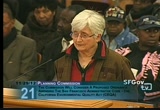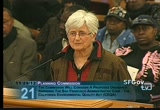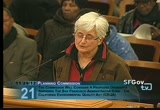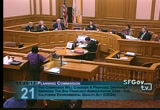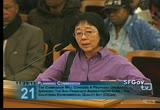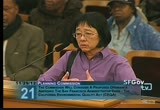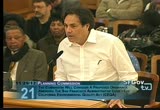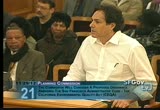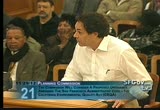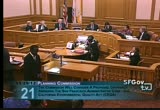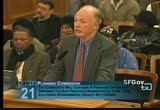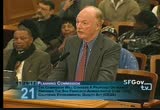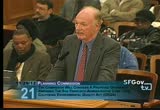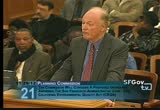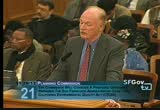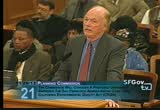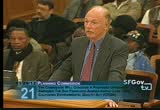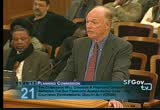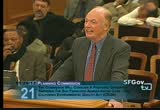tv [untitled] December 4, 2012 6:00am-6:30am PST
6:00 am
writing, very well reasoned and specific feedback. so, i just want to add my voice to say that i hope you're going to take seriously the concern that people who are involved in land use issues have about this legislation and feeling that it may make it harder for people to respond to real issues of c-e-q-a. i'm not sure about all the abuses that are being referenced. i don't know what those abuses are. my position, i'm a chair of a land use committee of neighborhood association, [speaker not understood] valley association which comes to castro and upper market. on my level there is some abuse
6:01 am
of c-e-q-a. c-e-q-a is hardly even brought to bear on the kind of projects that we're looking at. * no abuse however, eureka valley has an enormous number of historic resources which have not been mapped and have not been surveyed except for the windshield survey which, as i read the legislation, it seems as though those historic resources are not official and would not be protected with some level of protection would be removed by this legislation. they wouldn't be defined as historic resource, something like that. it's very com merit indicated, though. * complicated so, i think ordinary people who don't have a background in the law, they just have to rely on you to, to look at the details of this legislation and think about how it's going to apply,
6:02 am
how it's going to affect the public's right to know. i just add that our ability to know is very limited to know what's going on in the planning department, is very live ted. and when a project is under review in the planning department, we don't know that it's happening. now on the level that i work on, the neighborhood level, we now finally have the pre-application notification, brand-new, completely wonderful because we don't have to wait for the 311 notice before we know what's going on. so, please take to heart all the concerns that have been expressed to you. thank you. >> thank you. next speaker, please.
6:03 am
if i can have the overhead, please. good afternoon or good evening, commissioners. my name is joe butler. i'm an architect here in the city. one of the things that i had seen in the legislation because of some concern, if the resources that were inventoried hadn't been updated, if the inventory itself hadn't been updated within five years, then one couldn't use that inventory as a basis for declaring that a building is an historic resource. well, the planning department barely does inventory. and when they do the inventory there may be two or three or five-year's time. let alone the backlog of updating that would have to occur in order to make the existing adopted surveys updated for the purposes of this legislationedthv i'd like to show you on the overhead
6:04 am
some houses, 2564 sutter street. this house was saved by c-e-q-a. * water color of the same property, they wanted to take out the garden and put in you a garage and add about 5,000 square feet to this 1500-square foot home. this little house was saved by c-e-q-a, 40 38 17th street. 40 38 was to be replaced by an apartment building in demolition, but a c-e-q-a appeal saved that project. all the way along, the planning commission approved an apartment building. the board of appeals upheld an apartment building. but the board of supervisors said, no, the house has merit. this is the oldest house in noe valley saved by c-e-q-a, 39 chattanooga. they wanted again to make a multi-unit building here. many more thousands of square feet. because of c-e-q-a, they made an addition to the rear of this house and the historic resource was saved.
6:05 am
here's a case where the c-e-q-a notices that sue hester mentioned, they come in the mail. several of us have them. and somebody saw this photograph and said, that looks like a refugee shaq. and sure enough at 5 -- 252 hole -- holyoke, two refugee shacks [speaker not understood]. [speaker not understood] they were going to make an addition to loom over the little house in the front. the house had original windows. c-e-q-a saved this house. there is an addition at the rear which is the same footprint, the same square footage as the old building, but no more. 4 49 [speaker not understood] was not saved by c-e-q-a. they were allowed to lift this house up, put it in the center
6:06 am
of a three-story building and add a garage underneath it, triple the size of the building. nobody watched this one. >> thank you. >> and that's the difference between a successful outcome under c-e-q-a as we have it. >> thank you. your time is up, sir. if we can further, it would only get worse. (applause) members of the commission, my name is [speaker not understood]. i think what is before you today is purely procedure. it gives the public two things, especially when it comes to categorical exemption. it gives members of the public notice that something is going to happen so that if it is one of the cases that was referred to by mr. butler, the public would have 30-day notice so they can act on it early. what is happening now and what the type of individual most
6:07 am
affected by not having an appeal defined appeal period, the homeowners who want to do something to their home in the back, expand it, or someone who wants to tear a building down that has -- that does not have any significance, historic significance, what happens now, you go through the planning process, a dr is filed, you come before the commission. then you wait until a building permit is issued. then they go to the board of permit appeals. and then at the board of permit appeals they actually have a hearing, get the commission's decision affirmed, then there is a ten-day period on rehearing. the ninth day they file an appeal. what happens is then they go to the board of supervisors. one of the cases [speaker not understood] the commission knows about the one on 32nd
6:08 am
avenue and el camino del mar. that project is going to go back before you. it had a full hearing before this commission. but because of the process that i just described, it goes back to the drawing board. and, so, that project two years later is coming back before you after a new c-e-q-a review is again performed. so, all this legislation does is make sure the c-e-q-a review and appeal is done properly at an earliest possible time. and if anything fall through the cracks by the staff or a pushy developer, it gets caught early in the c-e-q-a process. and i urge that this commission vote in favor of this -- recommend approval of this ordinance to the board of supervisors.
6:09 am
hi, commissioners, [speaker not understood] san francisco preservation consortium. the whole conceptual basis for this legislation is instances of c-e-q-a abuse that brought this about. there is a little bit about codifying it and making it a little bit clearer. so, you're an independent body. you can requisition that information if you want. i wanted to point out there is a list of 48 appeals since 2010 that is part of your packet. the case studies that were done identified three of them -- three -- as abuse examples. one of them lafayette park wasn't a c-e-q-a delay. you heard two people here talk about that already. another one, 31 51 scott street cowed a maximum two-month delay.
6:10 am
so, a two-month delay is what this comes down to. the third, 28 53 broderick forced a discussion between neighbors and the developers who would not otherwise have happened. so, if you want to, why don't you go ahead and requisition that information. let's weigh this hevthv. one of the examples i could give you is that a single person filed a c-e-q-a review for 869 northpoint. * them but behind that c-e-q-a review, there were more than 200 people as part of the aquatic park neighbors. we sat around and said whose name goes on the c-e-q-a review? the reason we had to file that c-e-q-a review is because the process upstream wasn't performed correctly. what we found as a result of the review was that the developer, in order to obtain a demolition permit, had misrepresented, i.e., lied on
6:11 am
his applications about the age of the building, about its historical significance. thankfully, because of the review, there was the revelation that this in fact was property in a historic, prospective historic neighborhood, contiguous historic neighborhood block 26. we found that the person who had built the house and lived in the house had a direct historic recognition which is part of c-e-q-a. c-e-q-a recognizes historic contexts. because he was the reservoir keeper which is a block away. we also found out that the -- so, basically, the point of that is that if it weren't forsee qua in that case 869 would not have been -- it would have been demolished. it's an a forwardable house. a family is living there now. it was abuse of the process
6:12 am
upstream. so, c-e-q-a, had there been an appeal at the beginning of the project, would never have happened. this information would not have come forward from the planning department that did the further investigation. thank you. >> thank you. is there any additional public comment? okay. seeing none, public comment portion is closed and opening it up to commissioners for comments. commissioner borden. >> there's a lot to be said. i want to ask maybe staff a few clarifying questions about the legislation and just general process. so, one is the point that was brought up related to now you've moved it up, if there was a c-e-q-a -- if there was a zoning decision and general plan, zoning map amendment decision that was going before the board, then the c-e-q-a to be heard with that decision is what we were told.
6:13 am
does that mean it would supersede whether or not it had been heard at the planning commission? >> bill wyco, planning staff. simply no. all the example was a park merced treasure island. the process that went on -- >> right, right. just in general. >> would not be changed. [multiple voices] >> so, e-i-r is prepared, it's published. there is a hearing at this body. there is comments and responses. there's a -- >> my only question to you, so, the certification process would still have to happen -- that hearing to certify or not to certify, presumably we'd have to certify the document before it could go to the board -- >> that's correct. the only thing that changes on this proposal, department staff has raised some reservations about this proposal in terms of projects where the board is the ultimate decision maker in
6:14 am
terms of process. you know, those concerns are over the fact there isn't a briefing, if you want to call it that. someone can bring a matter f c-e-q-a to the board without having submittal of appeal process. supervisor wiener called it kind of automatic appeal right. on balance, our judgment is that given some of the procedural games that are played at the board around something being calendared and then it being not being able to be heard, in terms of the board's own procedures that there's advantage to this to this to outweigh that. cult managemently that is the decision of the board. the beneficiary of the proposal, that's the board. >> right, but i still want to get it straight. so, in order for them to actually hear any sort of zoning map amendments or legislative changes, the
6:15 am
ordinance or the project e-i-r already would have been heard or environmental negative declaration, or whatever, your appeal would already have to happen first under the commission? >> under the [speaker not understood] existing lack of rules, negative declaration would come to you unless somebody chooses to bring to you. even though the document itself says you have 20 to 30 days to appeal to the planning commission. someone doesn't do that now in the absence of rules, effective rules, what we say doesn't matter. >> and then, so, in terms of, you know, there's been an issue of other different sort of -- those other various permits, whether they be rec and park or a tree or -- all those other permits. are the appeals processes separate to those permits that are unrelated to c-e-q-a? >> [speaker not understood] the city attorney. basically contrary to what a couple people have said, not every single permit in the city is discretionary.
6:16 am
only discretionary permits are subject to c-e-q-a. so, the permits that are discretionary, there is c-e-q-a review that is conducted. at this time in general, other than the special notice of the ordinance -- >> i understand what you're saying. i'm trying to figure out like if someone appeals -- if i appeal a tree permit, is that a c-e-q-a appeal or is that an appeal to the permit just generally and it doesn't have anything to do -- i'm trying to determine the differences because i think that that -- one of the things that's up for deebate -- >> deputy city attorney susan cleveland noel. my colleague might be able to elaborate on this further. yes, you can appeal a permit for any reason. normally through the board of appeals. * you could also appeal that same permit in most instances under c-e-q-a. >> so, the question is some of
6:17 am
the appeals may not be c-e-q-a appeals. there would be other appeals. but then could you appeal the permit twice from the same agency, one time being c-e-q-a, one time being something else? >> that's what you do now, that's what you can do in the future. they're separate appeals. one is on the substance, the merits of the project. one is on the c-e-q-a. the difference now is depending on what permit it is, the public has made it abundantly clear, you may have no knowledge because there is no notice what they're supposed to do. if there is no notice about any discretionary action, that notice will incorporate notice about the c-e-q-a that would, you know -- >> but you could appeal c-e-q-a on nonplanning related permits. i just want to -- >> yes. so, i guess -- so, in terms of this argument, looking at the first discretionary action, can you describe what currently are considered -- you said not all permits are discretionary permits. so, could you outline some of the permits that are discretionary? maybe the city attorney could
6:18 am
do that. >> i'll take a start. i think the simplest thing is to talk about the things that are in the planning department's domain. conditional use permit is a discretionary permit. a building permit is maybe the most widespread for exemptions. but there are many departments that take discretionary actions. the park takes actions. mta takes actions, puc takes actions. some of those are discretionary, some are not. all that are discretionary subject to c-e-q-a. >> and did we look at -- in our recommendation, you know, i think there is a lot to be said about having a window of appeal. but why didn't we limit it to planning or building related discretionary permit? i think by far we have the biggest notice requirement of other agencies. it's a c-e-q-a appeal, i think it would be related to planning or building permits. did we think about that when
6:19 am
you were reviewing the legislation in terms of if you're going to choose a discretionary action as the trigger that it would be a planning or building permit only as opposed to, you know, kind of these ancillary permits? >> well, i don't think that the other permits are ancillary. in fact, maybe the concerns have been voiced here about those permits that are issued by other agencies where the notice is lesser bust. one of the things that's not really come out explicitly in this discussion is, and i think it's unlikely that the notice provisions will adversely affect how the planning department does things basically we'll send out a dr, 311 notice, a notice before this body, all of those notices, up until the point that action that triggers c-e-q-a review will say x has been [speaker not understood] in term of environmental review. at this hearing or some
6:20 am
subsequent hearing, there could be an action that would trigger a c-e-q-a review period. if you have c-e-q-a concerns, contact planning department, rec, park, whoever, and that department has an obligation to notify those people. and the thing i think has not come out at all in this discussion so far is if there isn't notice, then none of the streamlined process is triggered. similarly -- >> so, there is no notice, there is no streamline. >> in the legislation as it's written right now, there is a 20-day period for exercising appeals if you have notice. there is a 30-day period if there isn't notice. a number of people architect heritage has expressed concerns. if there isn't notice, why is 10 days more adequate? i think that's a fair question. you know, again, reminder that there is no notice requirement in c-e-q-a for exemptions period under c-e-q-a for any
6:21 am
kind of c-e-q-a action. there is a default of six months that has nothing to do with notice. >> right. >> so, that is something i think is, you know, a legitimate concern as to what is, should it be 30 days, should it be something else, should it be if you don't provide notice you default to the sachs statutory limitations of six months. that's up to the guidance that you and others provide and the supervisor and the board's judgment. >> and i guess my question, though, then, so just kind of playing this out. say my project is a dr, i'm going to use a dr as an example. part of my project would require me to remove a tree and put in two knew trees and then to do my edition. * new trees first i'd go to dpw, go get my tree permit that nobody is paying attention. that action happened. then it comes to the planning commission. is it now that they could not file a c-e-q-a appeal because
6:22 am
they didn't file it on the tree permit? >> again, assuming the tree permit is a discretionary action, we did a cad ex for it, the cad ex would only apply to the action if that's the only action that we had in place -- [multiple voices] >> if the information that we acted on was incomplete and there was a change to the project or further development of the project that changed those conditions, go back to go here. essentially the c-e-q-a clearance is on what we know and what we address. if we didn't address an aspect of the project because it wasn't put before us, then that becomes a new discretionary action subject to new environmental review subject to new appeals. i guess, i would imagine people would give the whole project -- i do think we're shortening the window. i guess the question is, then, what is the process currently?
6:23 am
like how someone related a story about trying to get to the planner and the planner was on vacation. is the only way that you can file an appeal is to reach the planner for the project? is there a website, can you go to the department? i don't know because i've never filed an appeal. maybe you could eliminate -- >> appeals for exemptions are solely to the board of supervisors. i was the person on vacation, i take a vacation once a year. >> i'm not criticizing you taking a vacation. [multiple voices] >> there was a notice on my e-mail, a notice on my phone message that says who can be reached in the case of this question. the person obviously didn't bother to follow-up on that. in the case the information she actually figured out is true, it wasn't right for an appeal because there is no c-e-q-a document had been prepared and there was no appeal that could have been filed at that time. >> right. i mean, i guess -- so, i could go to the planning department, file an appeal. there is a process for doing that, go to the website.
6:24 am
>> the appeal, e-i-rs -- negative declaration appeals, choose to appeal [speaker not understood], choose to appeal to the board. exemptions are only to the board. >> okay. thank you for the -- answering the question. i think that there are a lot of great procedural changes and codificationses that the legislation does that's really -- that need to be done. i think that that's very true. i think the challenge is that there are some details related to what that mean when you start talking about discretionary actions and how one discretionary action, do people game the system and get a discretionary action, a place where they're left notice, no one is paying attention so they can get -- have an easier time in other places. i think that is problematic. i also think the appeals window the 10 days, 20 days, 30 days, 30 days with no notice, 20 days
6:25 am
with some notice, is also somewhat problematic. those seem to be the two biggest issues that everybody is touching on. there is another thing about the fair argument which i don't see -- i can't find that language in the legislation because i'm not going to address it. it sounds like there's legal ramifications for even trying to change that wouldn't even -- beyond our concerns. but i think that there are real concerns about looking at what you would describe as the first discretionary action or what you would describe as discretionary actions. i also think that there is, you know, looking at what is an appropriate appeal window based upon those actions make sense. there is an issue, ms. hester acknowledged there is an issue with c-e-q-a. i think that's been frustrating for a lot of people because c-e-q-a provides information. it doesn't say, a project is good or a project is bad. it is a way of decision-makers
6:26 am
having information to determine whether or not they want to move forward with the project. in pretty much even on projects that people don't agree with the c-e-q-a document, it outlines that there are significant unavoidable impacts to whatever, you know. and you may agree that the statement of overriding consideration if you're talking about an e-i-r are great or not. in the areas of cad ex and negative declarations, i think that is an area where there is a bit of abuse because a lot of times we're talking about single-family homes, projects. when you're talking about cad x's, categorical exemption, i.e., a house becoming a house or a house expanding a house, that's the kind of cases you're talking about when you're talking about a cad goerth cat exemption. a negative declaration is usually -- it can be a similar situation but there's a little more complication because there's historic resource or historic district involved. and i think that we have seen
6:27 am
that people don't like a project, so they use c-e-q-a as the thing in the process. and it's hard because when people do that, it destroys the integrity of c-e-q-a in the sense that there are legitimate environmental concerns. projects like treasure island and the shipyard, they're truly environmental concerns and real issues there that c-e-q-a deals with. a lot of the socioeconomic policy sort of issues and questions that we have and concerns, c-e-q-a is not designed to deal with that and that's a whole 'nother conversation about the general plan and how we implement that and how we look at how we make our decisions. but that is those are not c-e-q-a issues and i think they often get commingled here when we're having the conversation. i think it is regrettable that there wasn't dialogue because one of the reasons we had an issue earlier that we didn't have dialogue with the community before the introduction of the legislation because of thing that create an add months fear of distrust so
6:28 am
that it's even hard for people to acknowledge that things that actually might be useful in the legislation, which there are some procedural outlines that do make a lot of sense that were put in the legislation. but there are other questions and challenges that need to be answered and looked at because i do think the law of unintended consequences is that people are concerned about. and i know that we're not going to resolve those issues here today. and i guess it's my advice to the supervisor would be really to spend some time looking at this issue around discretionary permits, the discretionary actions and appeals and triggers around that. and also around the window of appeals. and also notice. i actually don't like the reduction in notice for projects over 5 acres. we were talking about western soma earlier and the fact that the whole [speaker not understood] of the city being rezoned and people can be completely unaware that their properties, the nature of the
6:29 am
zoning of their properties is changing that could be negative. i don't think is a good thing. * swath i actually think that provision is problematic in this legislation. i'm generally supportive of reform and i'd like to see some reform because we have booker t. washington, other cases we have that there has been c-e-q-a abuse and the challenge that you do have is not only that you have the process of the city, but booker t. washington which we voted on a year and a half ago is still being litigated in the courts. so, you know, people can do c-e-q-a here, but they do c-e-q-a in the court. there is a challenge when people are he opposed to projects and they use c-e-q-a as the way to poe pose those projects. i wish there were a way to better separate those issues out from, you know legitimate environmental concerns. * but i don't think anyone is here wanting to weaken, talk about lessen the protections that we have because i think that everyone would recognize c-e-q-a has been valuable in decision-making process. all the
119 Views
IN COLLECTIONS
SFGTV: San Francisco Government Television Television Archive
Television Archive  Television Archive News Search Service
Television Archive News Search Service 
Uploaded by TV Archive on

 Live Music Archive
Live Music Archive Librivox Free Audio
Librivox Free Audio Metropolitan Museum
Metropolitan Museum Cleveland Museum of Art
Cleveland Museum of Art Internet Arcade
Internet Arcade Console Living Room
Console Living Room Books to Borrow
Books to Borrow Open Library
Open Library TV News
TV News Understanding 9/11
Understanding 9/11